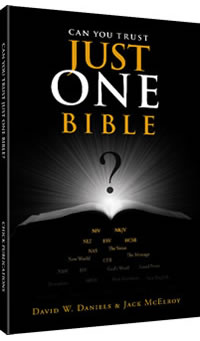Authorized Version No More Archaic Than Modern Versions Or Even The Newspapers
- Issue Date: March/April 1998
"Does the AV Bible (King James Version) contain archaic words? Certainly," says author Laurance Vance in his recent book, "Archaic Words and the Authorized Version."
But, he points out, so do modern publications such as Time, U.S. News & World Report, the Chicago Tribune, Forbes and the New Republic. "Also without dispute is the striking revelation that modern, up-to-date Bible versions like the NRSV, NASB, NIV, and NKJV likewise contain archaic words." Which Vance proceeds to prove by listing, in alphabetical order, all the "archaic" words used in the AV with full explanation of their origin, meaning, and their use or alteration in the four most popular "modern" versions. For good measure he throws in quotes containing those words in contemporary publications.
If no one ever complains to the editor or cancels his subscription over these "archaic" words, why should it be such a big deal over the AV Bible? Vance further demonstrates that a great many of the same words in the AV that people complain about even show up in the "modern" versions.
"For just as no one revises Shakespeare or Milton, but instead learns the vocabulary necessary to understand those particular works; and just as a certain vocabulary is necessary to understand science, medicine, engineering, or computers; so to read and understand the Bible one must be familiar with the vocabulary of the AV instead of dragging it down to one's own level by revising it."
In order for people to develop familiarity with the AV vocabulary, Vance has written a comprehensive study book of all the supposedly archaic words. It is arranged in alphabetical order so that a specific word can be researched, but it also makes for excellent reading.
Since a proper understanding of the Word of God depends on a clear understanding of the words in the Word, just browsing through Vance's book brings a richer, fuller understanding of God's Word.
Vance contends that it would be far better to stick with the AV and simply learn the meanings of the few words which are not in common use than risk the confusion caused by the distortions of meanings found in the modern versions.
- See more articles on related topics:
- Bible Versions
- King James Bible
Other Articles from March/April 1998:
- Castro Welcomes Pope, Harasses Home Churches
- A Chick Tract Filled the Gap
- Graham Agrees with Rome on Salvation
of Unreached
- Irish President Takes Protestant Communion Stirs Rome's Ire
- Go Where the Lost Are!
- A Message From Jack Chick March 1998
- Salvation - Muslim Style
- It Pays to Read Chick Tracts to Children
- Is It Hard To Be Saved?
- Court Upholds Student's Tract Passing Rights
More on Bible Versions:
Products of Interest:
-

22 pages
Definitions of over 600 less-familiar KJV words. Tuck it in your King James Bible as a handy reference tool. -

Can You Trust Just One Bible?
160 pages
Answers to the most common anti-KJV accusations. -

Answers to Your Bible Version Questions
224 pages
David W. Daniels answers difficult questions about the KJV. Learn how to defend the KJV and why you can trust it. -

Look What's Missing!
256 pages
For years, publishers have been removing words, and even whole verses, from modern Bibles. What's missing from your Bible? Take a look!



